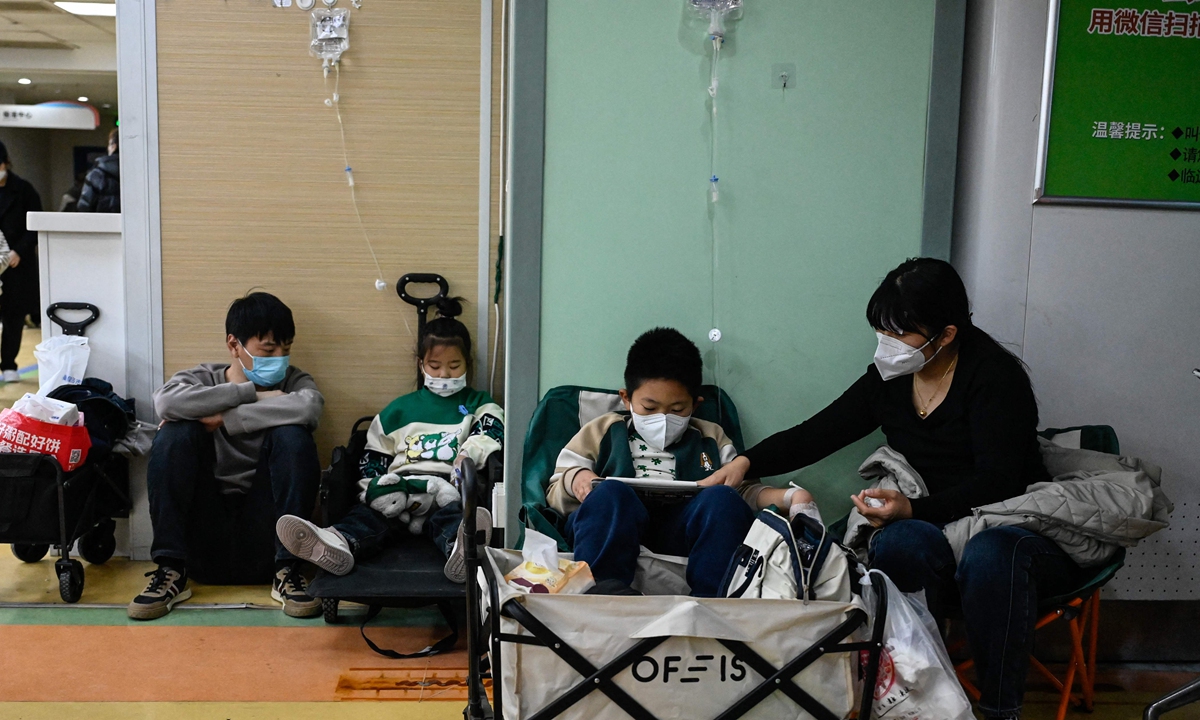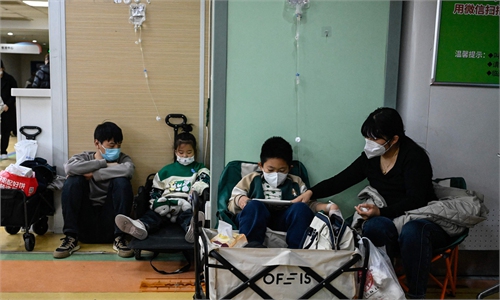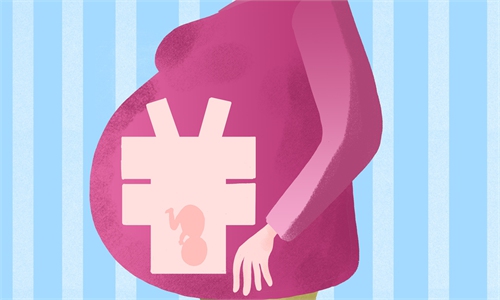
Sick children receive a drip at a children's hospital in Beijing on November 23, 2023. Photo: VCG
From providing more beds for pneumonia treatment and allocating more manpower to extending working hours, hospitals across China are grappling with a surge in cases of respiratory illnesses in children, especially a spike in mycoplasma pneumonia.
But the Global Times learned from several hospitals and clinics in Beijing, Shanghi and Central China's Henan Province that though facing an obvious increase in outpatient and inpatient visits for respiratory illnesses this winter, the health system has not been overwhelmed as it did during the early stage of the fight against COVID-19.
The Capital Institute of Pediatrics, a Beijing-headquartered renowned hospital for children, which has been one of the top choices for Beijing parents when their children get sick, has made several improvements to enhance its medical treatment capability - raising the number of infusion seats by 48.7 percent on the daily basis compared to their usual capacity, and also expanding the number of beds available for patients with pneumonia by 40.58 percent, according to Beijing Youth Daily.
In order to manage the high demand at the hospital, there has been an 86.36 percent increase in the number of doctors available for visits. Moreover, a dedicated fast-track system has been implemented for critically ill children, allowing them to receive diagnostic reports promptly, the Beijing Youth Daily report said.
The Global Times spoke with the pediatrics department at the First Affiliated Hospital of Henan University of Chinese Medicine on Wednesday. Zhou Rongyi, deputy director of the hospital's pediatrics department, stated that his department receives more than 2,000 visits a day, about 70 percent of whom are patients of respiratory tract infections. It has been hard to find a ward since October. Many children are infected with mycoplasma this time. One of the main reasons for this is the combination infections of influenza and mycoplasma."
As one of the coping measures, Zhou's hospital has opened pediatric wards previously used for treating COVID-19 patients to accommodate the surge in cases. Like many other pediatric hospitals, they have extended their working hours from 5:30 pm until 8 pm to provide convenience for working parents.
Zhou emphasized that "while some pediatric hospitals may have long queues and limited ward availability, overall, medical resources have not reached an overwhelmed state. Hospitals have learned from their experiences with COVID-19 and have developed strategies to prioritize severe cases and classify treatment based on symptoms."
Major hospitals and local health authorities have also disseminated information on influenza and pneumonia prevention measures to communities and grass-roots hospitals in a bid to alleviate pressure, Zhou said.
The overall medical situation in our hospital is currently stable, with a decrease in the number of children seeking treatment for mycoplasma pneumonia infection and an increase in cases of influenza, an expert from Shanghai Children's Medical Center, who asked for anonymity, told the Global Times on Wednesday.
The Global Times learned in Shanghai that major hospitals in this metropolis have been adding pre-examination tests, medical scheduling, and enhancing internet-based outpatient services as parts of their efforts to alleviate their pressure of receiving patients. The move has also reduced waiting time of patients.
Though facing overcrowding in hospitals, most people still tend to seek doctors in major hospitals. However, experts said, community hospitals can play a crucial role in managing this wave of respiratory disease.
A Beijing mother, preferred to be referred to as Song, who recently brought her child to the Liulitun Community Health Service Center in Beijing, shared her experience with the Global Times. Due to difficulties in registering at pediatric hospitals and long waiting times, she opted to visit the community hospital near her home. The doctor conducted various tests and prescribed medication for routine treatment. Song emphasized that parents do not need to overcrowd large hospitals when community hospitals are fully capable of providing effective treatment at an early stage.
Lu Hongzhou, head of the Third People's Hospital of Shenzhen, echoed this sentiment. He told the Global Times on Wednesday that most community hospitals can prescribe effective medications and treat respiratory diseases at an early stage.
This year's respiratory diseases are caused by commonly known pathogens, but there has been a noticeable increase in cases of mycoplasma pneumonia, which is more resistant to antibiotics due to long-term overuse. Zhou stated that in his clinical practice, about 80-90 percent of children infected with mycoplasma pneumonia are resistant to commonly used drugs. Early oral treatment in outpatient clinics is no longer effective, leading to more hospitalized cases.
Lu believes the recent outbreak of mycoplasma pneumonia is an "immunization gap," which resulted in children not having the opportunity to develop resistance to common viruses like influenza. As a result, when the COVID-19 restrictions were lifted, they became vulnerable to these pathogens, Lu told the Global Times on Wednesday.
Lu advised parents to consider the prevalence of the disease in their child's environment and seek timely diagnosis and medication. Lu reassured parents that there is no need to worry, as timely treatment can effectively manage infections like mycoplasma pneumonia.
Hypes are biased
Amid a surge in respiratory illnesses in China, which the country's health authorities have already attributed to known pathogens, certain overseas media reports have been sensationalizing the severity of the diseases and even raising doubts about China's transparency in dealing with respiratory illnesses. These reports have hyped concerns about whether travel restrictions should be imposed on China.
Respiratory and pediatric experts have rebuffed these claims, stating that such hype is not based on facts and reminding individual countries and media to avoid their biased perspectives when reporting on China-related affairs.
However, health experts reached by the Global Times have criticized these reports for sensationalizing an inhumane image of the country. The truth is that this practice is not common in hospitals across the country.
The Global Times found out that very few hospitals had set up study areas for children, including Jiangsu Nantong First People's Hospital. Later on, the hospital in Jiangsu clarified that the study zone was set up two months ago as a makeshift measure for students who haven't finished their homework, not as an encouragement for children to study while receiving medical treatment.
Both educational and health authorities in provinces including East China's Shandong Province as well as Beijing have also advised students not to take classes or do their homework when they are sick. Personal health always comes first.
When the World Health Organization made a standard request to China last week for information regarding the reported cases of "undiagnosed pneumonia," some Western media outlets publicized this request as unusual. Experts have noted that this was an attempt to sensationalize China's transparency over increase in respiratory diseases.
On Tuesday, when a reporter from Antara asked the spokesperson of China's Foreign Ministry about rising concerns among the international public about the safety of traveling to China as well as people who travel from China, Wang Wenbin, the spokesperson, said, "Let me assure you that it is safe to travel and do business here in China and there's no need to worry."
On Wednesday, answering a reporter from NHK about international attention over increasing outpatient and emergency visits, Wang said China's National Health Commission (NHC) held a press conference on November 26 to share information on the prevention and treatment of respiratory infectious diseases in winter. The NHC has had communication in a timely manner with the WHO, Wang emphasized.
Commenting on media's exaggerated worries and concerns about China's respiratory disease, Zhou, from the First Affiliated Hospital of Henan University of Chinese Medicine,told the Global Times that it is not surprising to see some Western media outlets spreading false information about China. ''But facts speak for themselves.''


